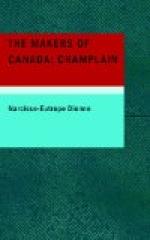Amongst Champlain’s party there was a young lad named Nicholas Marsolet, who desired to accompany the Algonquins in order to learn their language, and he was pleased to learn that after much deliberation the Algonquins had decided to take him, on the condition that Champlain accepted a young Huron as hostage. The Indian boy was named Savignon by the French. Lescarbot writes that he met this youth many times in Paris, and that “he was a big and stout boy.”
The French and the allied Indians separated with many promises of friendship. The Indians departed for the fall of the great river of Canada, and the French, with Champlain at their head, proceeded to Quebec. On the return journey they met at Lake St. Peter, Pont-Grave, who was on his way to Tadousac, to arrange some business connected with headquarters.
Pont-Grave contemplated passing the winter at Quebec, but in the meantime des Marets arrived from France, much to the delight of every one, as his vessel was long overdue. The news which he brought, however, was so serious that both Champlain and Pont-Grave decided to return to France. The intelligence received was to the effect that M. de St. Luc had expelled the Catholics from Brouage, that the king had been killed, and that the Duke of Sully and two other noblemen had shared the same fate.
Champlain was much distressed over the condition of affairs in France, and on his departure he left du Parc in command of Quebec, and placed under him sixteen men, “all of whom were enjoined to live soberly, and in the fear of God, and in strict observance of the obedience due to the authority of du Parc.” The settlement was left with a plentiful supply of kitchen vegetables, together with a sufficient quantity of Indian corn, wheat, rye and barley. Everything was in good order when Champlain set out from Quebec on August 8th, five days after Pont-Grave’s vessel sailed from Tadousac for France. On September 27th they arrived at Honfleur, the voyage having lasted one month and a half.
This second voyage of Champlain did not restore de Monts’ fortunes. The withdrawal of the exclusive privilege of trading was the signal for a large number of trading vessels to appear in the St. Lawrence. In fact the operations were so great as to render the profits of the company null. The disaster was so complete that Champlain says: “Many will remember for a long time the loss made this year.” For all the labour which Champlain had bestowed upon the settlement the result was small, and it was evident that if any French merchant were allowed without restrictions to trade with the Indians, commerce would be ruined, and the development of the settlement would be impossible. During the first years a beaver skin could be exchanged in return for two knives, and now fifteen or twenty were required for the same exchange. Champlain therefore desired to establish some form of rule by which commerce could be restricted, or in other words, whereby he or de Monts, or any one else who would undertake the direction of the affairs of New France, might be protected.




